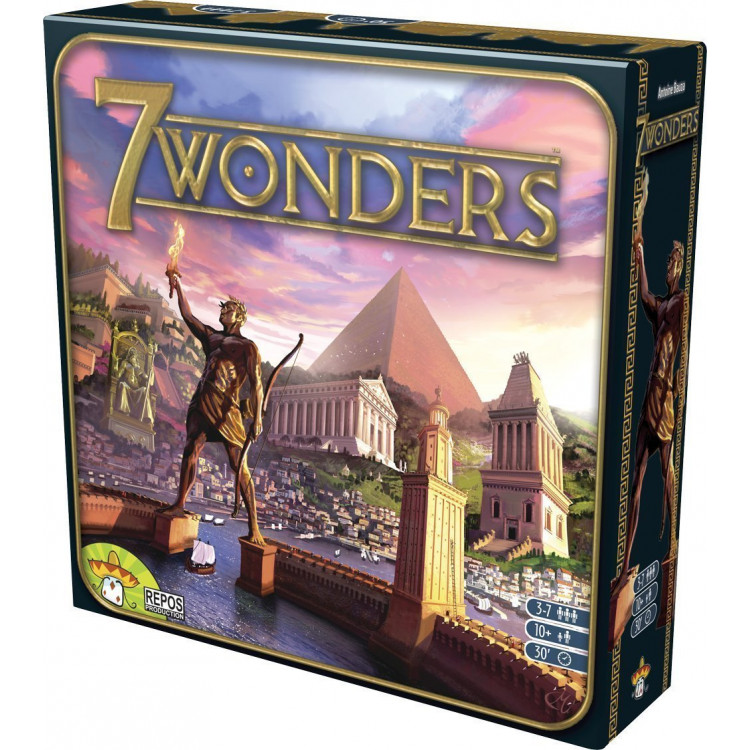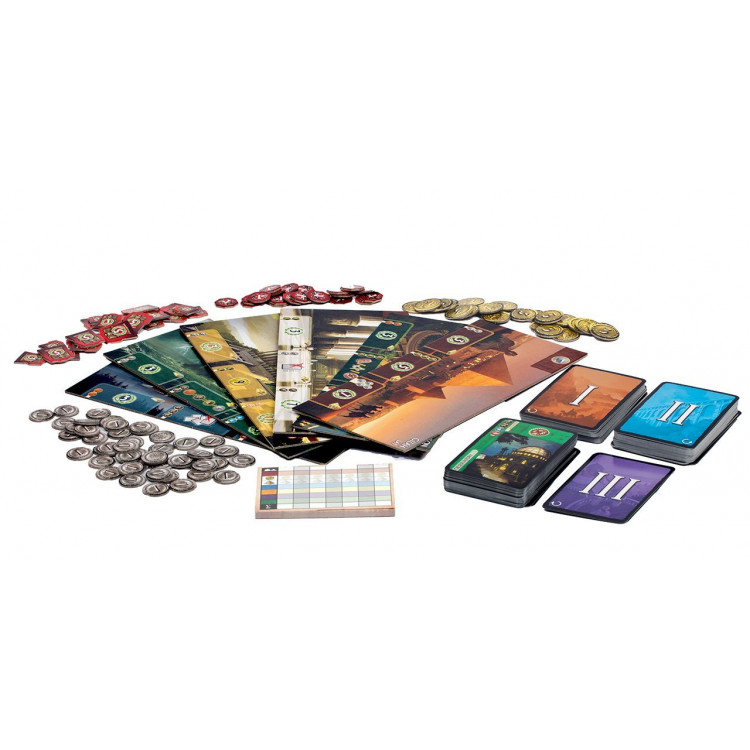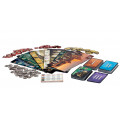



- SKU: 5425016920558
In 7 Wonders, a card game for two to seven players, you guide an ancient city from its first foundations to its greatest achievements. Your goal is to surpass your neighbors by developing better technologies, creating a richer culture, conquering in war, and constructing magnificent architectural marvels. Across three Ages you will expand and advance your city, and at the end of each Age you will take up arms against your opponents. The player with the most victory points wins.
Designed by Antoine Bauza, 7 Wonders is one of the most award-winning board games of all time. It has received the 2011 Kennerspiel des Jahres and Deutscher Spielpreis, the Dice Tower awards for 2010 Best Game of the Year and Best Game Artwork, and the 2011 Golden Geek Award from Board Game Geek, among numerous others.

Competing Constructions
At its core, 7 Wonders is a civilization building game. You begin by choosing which ancient city to develop: the trading center of Rhódos, cosmopolitan Éphesos, secluded Olympía, or four others. Over the course of three ages, you’ll pass cards from player to player, shaping your chosen Mediterranean city one card (one structure) at a time. Simply select a card and play it face-up to add that structure to your city. You’ll choose from structures that produce raw materials, ones that create manufactured goods like cloth and glass, commercial structures like taverns, civilian structures like theaters, scientific structures like laboratories, and military structures like stockades. Brown and gray structures give you the basic resources necessary to create other buildings and make further innovations. Blue ones offer victory points; gold ones bring money or discounted goods. Green ones advance your progress in three major scientific fields and ultimately provide victory points. Finally, red military structures enable you to attack your neighbors and defend against their attacks.

The greatest cities have humble beginnings. Yours is no different: the first step to creating the Great Pyramids or the Colossus is amassing raw materials, manufacturing goods, and establishing urban life. During Age I of 7 Wonders you’ll mine ore veins, harvest lumber, launch a glassworks, and invent the papyrus press. You may create marketplaces and altars, guard towers and workshops. The city you develop also provides you with a beginning resource: in Olympía, for example, you have ready access to wood, in Halikarnassos, to cloth.
The most basic structures require little or no investment, but to build public baths, you need stone. For stables, you need wood. For a scriptorium, you need papyrus. These structures demand resources, visible in the upper left-hand corner of the card, that you must possess in order to build that structure. As you move into Age II, you’ll find that structures require more and more raw materials and manufactured goods, even as they give you more victory points and other advantages. You’ll also discover that some structures enable you to build others for free: if you have a scriptorium, you can build a library without any stone. Once you’ve established a trading post, you can expand it into a forum. A temple can easily become a pantheon.

Developing Wonders
Ancient Greek authors named seven wonders of the ancient world, located in cities across the Mediterranean. You select which one you will build at the moment you choose your city (you cannot, for example, build the Hanging Gardens of Giza). Each wonder offers a different resource or material good, has specific requirements each stage of its construction, and grants a unique reward at every stage. As soon as you have the requisite resources to complete a stage, slide a card facedown under your wonder board instead of building that card as a structure. You must complete the stages of your wonder in order, but you can do so during any Age.
For example, to lay the foundations of the Temple of Artemis at Éphesos, you need two stone resources, but you'll immediately receive three victory points. Finishing the second stage demands two wood resources, and doing so immediately places nine coins in your coffer. The third stage, which you can complete as soon as the other two are done, offers seven victory points and requires only two papyrus resources. Completing your wonder doesn’t guarantee victory, but it can put you closer to it. No matter what, having a wonder brings your city renown across the ancient Mediterranean.

Creating Commerce
No city has ever been self-sufficient. Greek scientists and historians produced their work on Egyptian papyrus; the Ancient Egyptians imported glassblowing technology from the Near East. If you lack the resources to build a structure, you can purchase them from a player on either side of you who possesses it. Typically, a resource costs two coins, but some commercial structures, such as marketplaces and trading posts, can save you money. Other commercial structures, like forums, grant you resources for free.
Commerce lets you benefit indirectly from your neighbors’ prosperity. Many of the purple Guild cards that appear in Age III go further than that by granting victory points for what your neighbors have built. The Philosophers' Guild gives you a point for every scientific structure in neighboring cities; with the Spies' Guild, you earn points for your neighbors’ military fortifications, arsenals, barracks, and circuses. Some Guilds, however, offer last minute boosts based on your own achievements. The Scientists' Guild offers you an extra scientific symbol of your choice. The Shipowners' Guild grants points for every brown, grey, and purple card you have played. The Strategists' Guild rewards you for victory in combat.

Waging War
Throughout the game you can build military structures: stockades, guard towers, walls, arsenals, and more. Each one has a certain number of shields, and the total number of shields in your city is your military strength. At the end of each Age you take up those shields as your weapons and do battle with both of your neighbors—the same people that you have been trading with throughout the game. Wars in 7 Wonders are duels, and the city with the most shields wins. The defeated party always sacrifices one victory point, but the amount that the conqueror wins gradually increases, from one point in Age I to three points in Age II, and finally five points in Age III.
If you neglect to build military structures, you leave your city open to attack, but winning an arms race against your opponents does not guarantee victory. Focusing too much on the threat or opportunity of war can be a waste of time and resources. True success lies in balancing military concerns against all other aspects of your city’s growth.

















